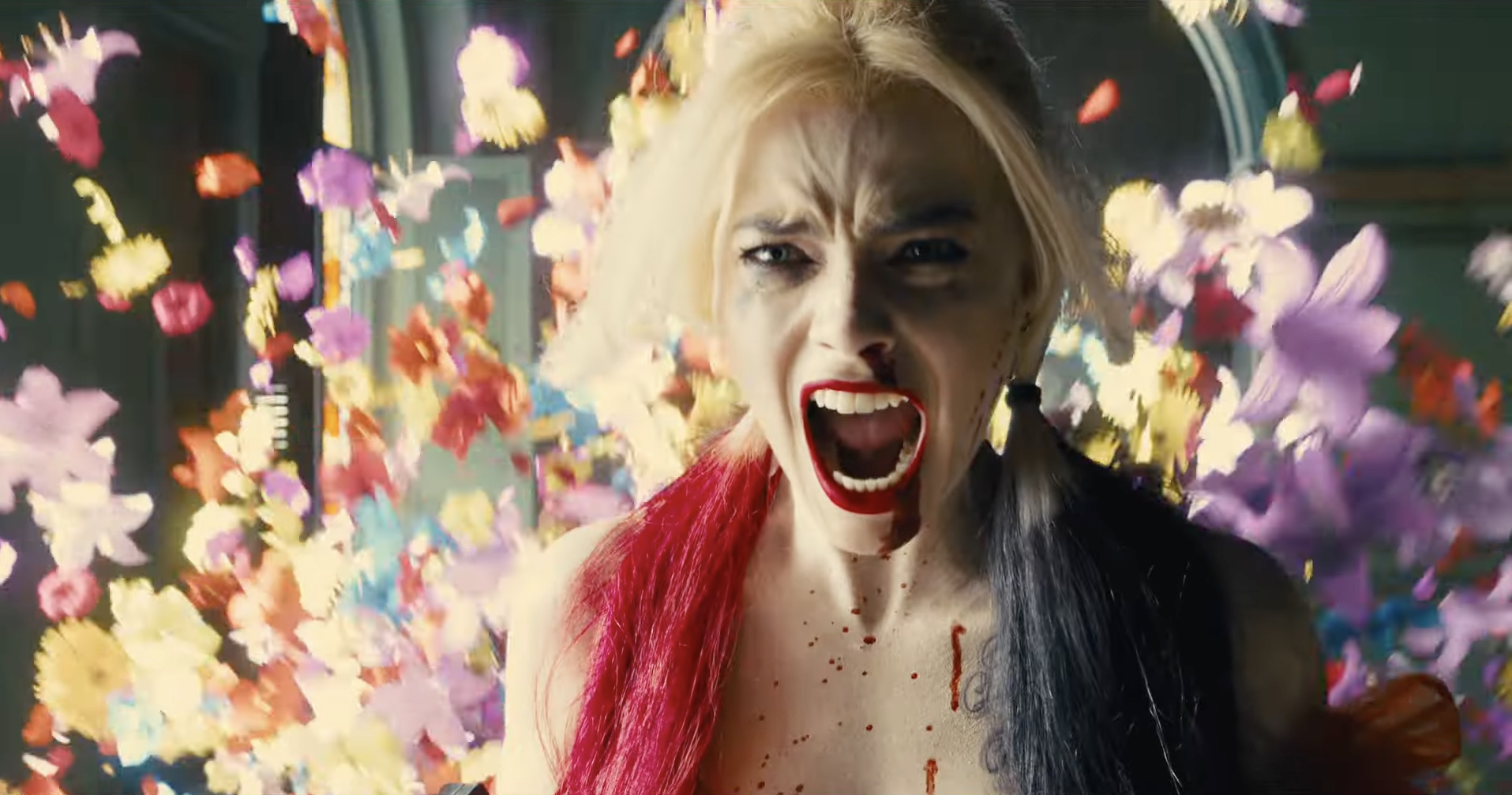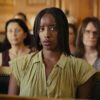Help keep The Curb independent by joining our Patreon.
There’s a phenomenal majesty to Margot Robbie’s cocaine-cloud, sugar high, ultra-violence loving anti-hero Harley Quinn. Finally relinquished of the dead-weight dropkick boyfriend in Birds of Prey, Harley Quinn is given further opportunity to gracefully soar into an unbridled full flighted mayhem in James Gunn’s The Suicide Squad. While Robbie’s iconic character is just one small piece of a cacophonous puzzle, she is the vital piece that holds the surprising emotionality of the narrative together.
The plot, for what it is, is rudimentary and familiar. Almost entirely bereft of any timeline relevance, a genuinely freeing aspect that allows The Suicide Squad to exist by itself, this DCEU entry follows a rag-tag team of reluctant anti-heroes thrust into a war scenario where they have to destroy a mammoth research facility in the fictional country of Corto Maltese. If they fail or go against orders, they’ll conveniently get their heads blown off by their brute-force leader, Amanda Waller (a stone faced Viola Davis, chewing up the scenery).
James Gunn instantly sets the stakes with a death count of name characters and iconic actors in the first ten minutes of The Suicide Squad, with a gloriously bloody, brutal, and masterfully manic ‘storm the beach’ sequence that rivals Saving Private Ryan for intensity. While there’s a certain delight in seeing cartoonish-costume-clad crims getting burnt to a crisp by exploding helicopters and churned to chum by a swarm of bullets, it’s the look of terror from one character as they flee the beach, seeking death by head-explosion rather than what the void of darkness in the jungle may offer, that helps create a foundation of relatable humanity within the film.
For fans of Gunn’s other films, notably the masterful Guardians of the Galaxy series, the aspect of emotionality in a world of heightened absurdity should come as no surprise. But, given the pedigree of characters we’re dealing with here, it is a surprise that a talking giant shark, a man who throws polka dots at people, and, of course, Queen Harley Quinn herself, amongst others, can create a genuine feeling of connection, compassion, and care within a film that celebrates carnage, gore, teen-like comedy, and a magical array of expletives that only the mind of James Gunn could conjure.
What’s equally surprising is how Gunn managed to get away with creating a furious condemnation of America as a whole within a major comic book blockbuster. Placing the beloved, charming, family-friendly wrestler John Cena as an uber-patriotic, freedom at all cost (even the deaths of women and children) Peacemaker, is quite simply inspired and works as one of the most subversive casting moves in a long time.
The Suicide Squad thrives because of the way Gunn pulls his characters together organically. Given their loner-status, they each initially push against each other, before being pulled by their circumstance into becoming genuinely empathetic characters. The quiet MVP of the piece is Daniela Melchior’s Ratcatcher 2, who, alongside her charming rodent pal Sebastian (Jaws/Crisp Ratt), grounds the film completely with her ability to see the true humanity within her nefarious friends. The bond that Ratcatcher 2 creates with Nanaue (Sylvester Stallone) is tangible, and, if you’re an animal lover like me, will have you reaching for the Kleenex come the climax.
Again, that animal kingdom fondness is something that positively thrives within Gunn’s work. Rocket in Guardians Vol. 2 brings the Marvel series a much needed boost of emotional depth and empathy, just as the giant shark Nanaue and Sebastian drive a welcome level of compassion to The Suicide Squad. Mark my word: this August, you will believe that The Suicide Squad will make you cry.
At the beginning of 2021, I decided to only review Australian films going forward, but in watching The Suicide Squad I was reminded about how essential it is to champion and celebrate the Hollywood careers of Australian legends, hence this review here. Naturally, Margot Robbie is an icon in her own right, and as such it’s worthwhile highlighting how completely she has embraced a cast of unfairly maligned figures in the cultural sphere.
Her transformative turn as Tonya Harding in I, Tonya provided a relatability and humanity to a figure that was manufactured into a scowling villain by mainstream media in the nineties, whereas her proudly respectful turn as Sharon Tate in Once Upon a Time in Hollywood… celebrated a legend whose life was cut off far too soon. In many ways, Robbie carefully carries Tate’s beacon forward, embracing the career trajectory that she should have had, and continuing her legacy.
And then, of course, the Queen in question, Harley Quinn, a character who has burst onto the screen with all the vigour and verve that the comic book film industry desperately needed. Out of the memorable figures in a universe that’s dominated by Supermen and Batfolks, it’s Robbie’s punked-up jester that’ll stand tall proudly as the iconic portrayal of a comic book character after this whole charade has wrapped up. Robbie’s desire to make this character completely her own is apparent in every scene, as is her drive to draw out the human aspect of who Harley Quinn is as a person. She is a fully fleshed out character with her own wants, desires, and worldviews, all of which match up with tearing down a pseudo-dictatorship and destroying a children-harming plan. After all, this is an anti-hero who voted for Bernie Sanders.
If there’s a complaint, it’s that while Harley Quinn is given the freedom to openly lust after men here, The Suicide Squad is actively devoid of celebrating her bisexuality, denying her the chance to swoon over any of the women characters. This is a shame, as the groundwork given to Quinn in Birds of Prey sets up her character arc as being someone in full flight, free of the Joker-shaped anchor that held her back. Additionally, this doesn’t seem to be any kind of pearl-clutching decision making from the powers that be, given how Gunn is afforded free reign in other aspects of his script, making that bisexual void carry a little bit more of a sting.
The Suicide Squad is stacked with well-written characters that’ll hook you in, with Harley Quinn’s show-stealing breakout centrepiece sequence that’ll have you crying with delight. Where Cathy Yan showcased some truly imaginative and memorable fight sequences in Birds of Prey (that cocaine-fuelled beat-em-up is an all timer), James Gunn yes-and’s those scenes with a pinnacle point in the DCEU with Harley Quinn breaking out of a heavily-armed palace, laying waste to everyone and all that come in her path. In a flurry of giddy delight, each kick, shot, and punch, explodes in a burst of literal-cartoon brilliance, with bright flowers and cheerful birds spurting out of the geysers of blood that stream out of the fountain of wounds.
The Suicide Squad has so many iconic characters and memorable moments that I haven’t even mentioned the captivating turn from the always-watchable Idris Elba as Bloodsport, a cockney-adjacent equivalent to Cena’s crank yank, nor have I touched on the blink and you’ll miss it touching cameo from Taika Waititi, or the jaw dropping hilarity of the climax. These treats, and countless more, are essential to discover for yourself.
When given a creative sandpit that includes a mammoth library of obscure characters to play with, plus a huge budget to bring them to life, and the freedom to dance with extreme violence and gore, it’s clear that James Gunn had the time of his life making The Suicide Squad. Gratefully, the cacophony of chaos, violence, cocksure machismo and obnoxious American egos that he manufactures as the foundation allows characters like Ratcatcher 2, Nanaue, and Harley Quinn, to soar in what is easily one of the great comic book films ever.
Director: James Gunn
Cast: Margot Robbie, Daniela Melchior, Idris Elba
Writer: James Gunn



